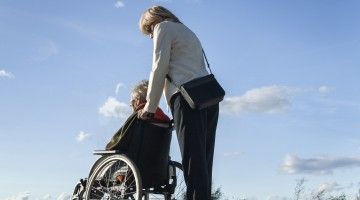Plain-language summaries
Institute for Work & Health (IWH) plain-language summaries condense research findings in various formats. At Work articles explain study results with comments from the study leads. Research Highlights summarize journal articles in easy-to-read, digest formats. Sharing Best Evidence summaries highlight findings from systematic reviews and other types of reviews conducted or led by IWH researchers. Issue Briefings discuss key research findings from IWH or elsewhere on topics that are of particular interest to policy-makers.

At Work article
Despite pain and fatigue, older workers with chronic conditions want to work to age 65
IWH study of retirement expectations finds boomers with health issues have same plans as healthy peers
Published:

Research Highlights
How do OHS leaders use health and safety benchmarking?
Workplace health and safety leaders use benchmarking reports on health and safety performance to help inform decision-making and improve occupational health and safety performance. That's according to an interview-based study of OHS leaders who took part in an IWH leading indicators research project.
Published:

Research Highlights
Examining the link between working conditions and tobacco-smoking habits
People who work or have worked in physically demanding jobs are about twice as likely as people whose jobs are not physically demanding to be heavy smokers. Workers in jobs with low social support, low skill discretion and high psychological demands are also more likely than workers in healthier environments to be heavy smokers.
Published:

Research Highlights
Understanding the types of Ontario workplaces that offer both wellness and OHS programs
Most Ontario workplaces offer few wellness initiatives. The ones that offer a variety of wellness initiatives and have high-performing OHS programs tend to be large workplaces with people-oriented cultures.
Published:

Research Highlights
Psychosocial work conditions and mental health
Having positive mental health is not the same as having no mental illness. The two are related, but distinct, concepts. A study by IWH suggests that better psychosocial work conditions—greater job security, job control and social support—can have greater influence on one more than the other.
Published:

Research Highlights
Gender differences in the impact of eldercare on work
Women are much more likely than men to stop working, to work part time and to temporarily take time off work in order to care for an older relative. These differences are seen even after taking into account factors such as marital status, having children, hours of work, pay level, job tenure, and status as main wage earner in the household.
Published:

At Work article
Workplace violence against women rising, driven by growing rates in education sector
Risks of workplace violence for men in health care on the decline, now lower than risks for female educators
Published:

At Work article
Ontario’s working-at-heights training led to safer practices, reduced injury claims rates
Institute for Work & Health’s multi-part evaluation of province’s mandatory training standard found claims reduction greatest among small employers and high-risk construction subsectors
Published:

At Work article
Women’s work more likely than men’s to be disrupted due to caring for older relatives
IWH study finds women 73 per cent more likely than men to permanently leave a job due to eldercare
Published:

At Work article
Supported job placements help young adults with disabilities find work: review
IWH systematic review finds strong evidence for job placements offered with personalized coaching
Published:

At Work article
Boomers with and without chronic conditions have similar needs for workplace supports
IWH study of older workers finds those in good health similar to those with arthritis or diabetes in using—and benefiting from—programs such as flex-time and telework
Published:

At Work article
Supportive supervisors help reduce risks when workers face hazards, lack protection
Study examining Institute for Work & Health’s OHS vulnerability framework finds supervisor support can lower injury risks for workers reporting hazards and inadequate protection
Published:

At Work article
Slight improvements seen in workplace psychosocial conditions over 10 years
IWH analysis of Statistics Canada surveys from 2002 and 2012 finds better scores on job security and co-worker and supervisor support
Published:

At Work article
Calculating the costs of employers’ work-related injury prevention efforts in Ontario
New IWH Issue Briefing lays out estimates of employer spending on worker health and safety in 17 sectors
Published:

At Work article
IWH review outlines promising strategies to prevent prescribed opioid abuse
Research synthesis by Institute for Work & Health examines programs and policies aimed at reducing the misuse and abuse of prescription opioids and preventing overdose deaths
Published:

Issue Briefing
What do employers spend to protect the health and safety of workers?
While the financial costs of work-related injury and illness are well known, limited information is available on what employers spend to control or eliminate the causes of work-related injury and illness. This Issue Briefing describes the results of a 2017 study to estimate occupational health and safety expenditures among employers from 17 economic sectors in Ontario, Canada.
Published:

Research Highlights
Facilities near or at work and off-hours exercise levels
Three in four working Canadians have access near or at their work to a gym, a sports field, a pleasant place to walk, a fitness program, an organized sports team, a health promotion program or a shower/change room. Leisure-time exercise levels are highest for workers with access to all the above. They are twice as likely to exercise in their off-hours as workers with access to none of these.
Published:

Research Highlights
OHS vulnerability among new immigrants
Recent immigrant workers are 1.6 times more likely than Canadian-born workers to experience occupational health and safety (OHS) vulnerability, defined as exposure to hazards without adequate protection to mitigate those hazards.
Published:

Research Highlights
How workplace support needs differ for younger and older adults with chronic disease
When it comes to workplace supports, people with chronic disease have similar needs, even at different ages and career stages. However, young people face unique challenges related to accessing workplace supports, including a lack of available workplace resources and difficulty overcoming preconceptions around youth and chronic conditions.
Published:

Research Highlights
Gender differences in the link between psychosocial work exposures and stress
Women’s and men's stress levels are affected differently by psychosocial work exposures such as supervisor or co-worker support, job control, job demand and job insecurity.
Published: